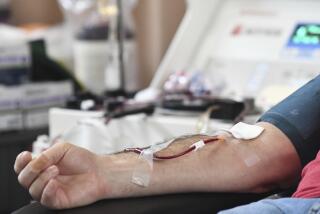AIDS Workplace Guidelines Win Praise : But Dannemeyer Vows to Continue Fight to Restrict Victims’ Jobs
- Share via
WASHINGTON — The federal government’s new guidelines on AIDS in the workplace won immediate endorsement Thursday from public-health organizations and homosexual-rights groups as “an extremely rational” approach to the disease.
“This document encompasses our concern for the physical and emotional care of these patients, the safety of health-care workers and the welfare of the public,” said Eunice Cole, president of the American Nurses’ Assn.
The guidelines, released Thursday by the Department of Health and Human Services, recommend against routine blood screening of employees for AIDS antibodies and against restrictions on workers known to be ill with the disease or infected with the virus. The blood test for antibodies detects exposure to the virus that causes AIDS, known as HTLV-III, but does not mean that an individual has or will develop the disease.
Dannemeyer an Opponent
But California Rep. William E. Dannemeyer (R-Fullerton) vowed to continue his fight for legislation that would forbid AIDS victims from working in the health-care industry.
“The people in the Public Health Service are erring on the side of protecting the sensitivity of the victims of AIDS--75% of whom are male homosexuals--when they should be erring on the side of protecting the public health,” Dannemeyer said. “Serious consideration should be given as to whether or not they should be permitted to continue in their jobs.”
Dannemeyer has introduced five bills dealing with AIDS, or acquired immune deficiency syndrome. Among them is a measure that would eliminate federal funds to hospitals and other health-care facilities that permit health-care personnel with AIDS to practice.
Apply to Cosmetologists
The new national guidelines, which do not have the force of law but have a considerable amount of influence within the public-health community, apply to workers in jobs where there is no known danger of AIDS transmission, as well as to health-care professionals and personal-service workers, such as cosmetologists, who may be exposed to the disease in their jobs.
The recommendations say that restrictive procedures such as proposed by Dannemeyer are unnecessary because there is no medical evidence that AIDS is transmitted by the casual contact that takes place in the majority of workplaces. However, the department said that separate guidelines addressing health-care practitioners who perform surgery and dentistry, where there could be some risk of AIDS exposure through the exchange of blood, will be forthcoming in January.
Dr. James O. Mason, acting assistant secretary for health, said the guidelines are designed to dispel unwarranted fear regarding casual contact with AIDS patients.
Recommendations Endorsed
“Often that kind of fear leads to suggestions (that) we take certain actions--which would do nothing at all about transmission,” he said at a news conference Thursday. “The philosophy behind these guidelines is the public health--first, foremost and always.”
The recommendations were quickly endorsed by the American Dental Assn., the American Nurses’ Assn., the American Public Health Assn., the U.S. Conference of Local Health Officers, the Assn. of State and Territorial Health Officers, the National Assn. of County Health Officers, the National Gay Task Force and the American Foundation for AIDS Research, a private fund-raising organization.
“The recommendations are extremely rational,” said Dr. Gary Simon, associate chairman of the department of medicine at George Washington University School of Medicine. “They take into account the needs of individuals infected, health-care and other workers and the population at large.”
California Rep. Henry A. Waxman (D-Los Angeles), chairman of the House Energy and Commerce subcommittee on health, agreed.
End Politicking
“I hope (this) will end the politicking about AIDS and AIDS scares,” he said, calling the recommendations “the best advice of the world’s experts.”
Cole, asked about Dannemeyer’s legislation at a separate news conference, said she believes it does not “have all the facts together.” She said: “It needs to be very carefully discussed before it moves forward.”
AIDS destroys the body’s immune system, leaving it powerless against otherwise rare infections. It is transmitted through sexual contact--with the exchange of bodily fluids such as semen and blood--and through the sharing of unsterilized hypodermic needles. It has also been spread through transfusions of contaminated blood or blood products, although a blood-screening procedure begun last year has now made that risk slight.
Those at highest risk include male homosexuals and bisexuals, intravenous drug users and their steady sexual partners. As of Monday, there were 14,739 reported cases and 7,545 deaths.
More to Read
Sign up for Essential California
The most important California stories and recommendations in your inbox every morning.
You may occasionally receive promotional content from the Los Angeles Times.













